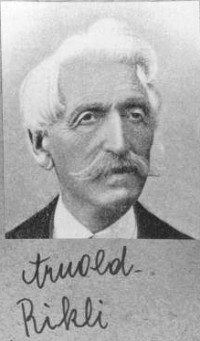Arnold Rikli
Swiss natural healer and advocate of sunbathing
Arnold Rikli (13 February 1823 – 30 April 1906) was a Swiss natural healer who is best known for his pioneering work in heliotherapy, the therapeutic use of sunlight. Rikli's methods emphasized the importance of sunlight, fresh air, and water in promoting health and well-being.
Early Life[edit | edit source]
Arnold Rikli was born in Wangen an der Aare, Switzerland. He was the son of a successful industrialist and initially followed in his father's footsteps by working in the family business. However, Rikli's interests soon turned towards natural healing and the potential health benefits of natural elements.
Career[edit | edit source]
In 1855, Rikli moved to Bled, a small town in what is now Slovenia, where he established a health resort. He believed that the combination of sunlight, air, and water could cure a variety of ailments. Rikli's methods were based on the principles of nature cure, which advocated for the use of natural elements to restore health.
Heliotherapy[edit | edit source]
Rikli is often credited with being one of the early proponents of heliotherapy. He developed a regimen that included sunbathing, air baths, and water treatments. His approach was holistic, focusing on the body's natural ability to heal itself when exposed to the right environmental conditions.
Influence and Legacy[edit | edit source]
Rikli's work gained popularity in the late 19th and early 20th centuries, influencing the development of natural medicine and alternative medicine. His health resort in Bled attracted visitors from across Europe, seeking relief from various health conditions. Rikli's emphasis on sunlight as a healing agent laid the groundwork for future research into the benefits of vitamin D and phototherapy.
Philosophy[edit | edit source]
Rikli's philosophy was encapsulated in his motto: "Water is good, air is better, but light is best of all." He believed that the human body was designed to thrive in natural conditions and that modern lifestyles, which often limited exposure to natural elements, were detrimental to health.
Criticism[edit | edit source]
While Rikli's methods were popular among many, they were also met with skepticism by the medical establishment of the time. Critics argued that his treatments lacked scientific validation and that his claims were exaggerated. Despite this, Rikli's ideas have persisted and continue to influence modern holistic health practices.
Death and Commemoration[edit | edit source]
Arnold Rikli passed away on 30 April 1906. His contributions to natural healing and heliotherapy are remembered in Bled, where a monument stands in his honor. His work continues to be studied by those interested in the history of natural medicine.
Related pages[edit | edit source]
Search WikiMD
Ad.Tired of being Overweight? Try W8MD's physician weight loss program.
Semaglutide (Ozempic / Wegovy and Tirzepatide (Mounjaro / Zepbound) available.
Advertise on WikiMD
|
WikiMD's Wellness Encyclopedia |
| Let Food Be Thy Medicine Medicine Thy Food - Hippocrates |
Translate this page: - East Asian
中文,
日本,
한국어,
South Asian
हिन्दी,
தமிழ்,
తెలుగు,
Urdu,
ಕನ್ನಡ,
Southeast Asian
Indonesian,
Vietnamese,
Thai,
မြန်မာဘာသာ,
বাংলা
European
español,
Deutsch,
français,
Greek,
português do Brasil,
polski,
română,
русский,
Nederlands,
norsk,
svenska,
suomi,
Italian
Middle Eastern & African
عربى,
Turkish,
Persian,
Hebrew,
Afrikaans,
isiZulu,
Kiswahili,
Other
Bulgarian,
Hungarian,
Czech,
Swedish,
മലയാളം,
मराठी,
ਪੰਜਾਬੀ,
ગુજરાતી,
Portuguese,
Ukrainian
Medical Disclaimer: WikiMD is not a substitute for professional medical advice. The information on WikiMD is provided as an information resource only, may be incorrect, outdated or misleading, and is not to be used or relied on for any diagnostic or treatment purposes. Please consult your health care provider before making any healthcare decisions or for guidance about a specific medical condition. WikiMD expressly disclaims responsibility, and shall have no liability, for any damages, loss, injury, or liability whatsoever suffered as a result of your reliance on the information contained in this site. By visiting this site you agree to the foregoing terms and conditions, which may from time to time be changed or supplemented by WikiMD. If you do not agree to the foregoing terms and conditions, you should not enter or use this site. See full disclaimer.
Credits:Most images are courtesy of Wikimedia commons, and templates, categories Wikipedia, licensed under CC BY SA or similar.
Contributors: Prab R. Tumpati, MD

